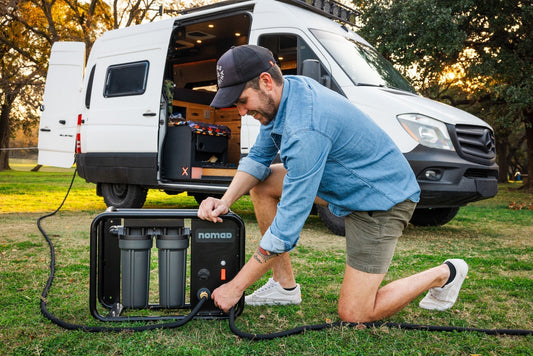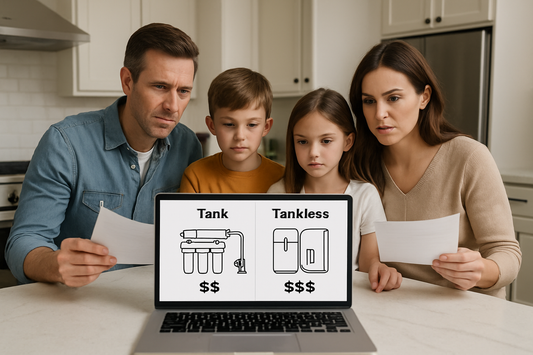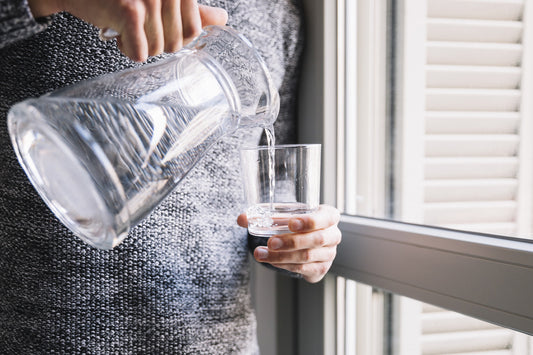Water Filtration Myths Debunked: Your Complete Guide to the Best Water Filters 2025
When it comes to home water quality improvement, misinformation spreads faster than facts. As homeowners increasingly prioritize their family's health and wellness, understanding the truth about water filtration has never been more critical. This comprehensive guide tackles the most persistent water filtration myths debunked by industry experts, while helping you navigate the best water filters 2025 has to offer for your specific needs.
Why Water Filter Facts Matter More Than Ever
The water filtration industry has evolved dramatically, yet outdated beliefs continue to influence purchasing decisions. Recent studies show that 68% of American households now use some form of water filtration, yet many still operate under misconceptions that could impact their health and wallet. Understanding accurate water filter facts empowers you to make informed decisions about your family's drinking water.
Myth 1: Bottled Water is Always Superior to Filtered Water
The Persistent Belief This myth remains surprisingly prevalent, with marketing campaigns reinforcing the idea that bottled water represents the gold standard of purity and safety.
Water Filter Facts That Debunk This Myth The reality challenges this assumption entirely. The FDA regulates bottled water similarly to tap water, and approximately 25% of bottled water actually originates from municipal sources—essentially filtered tap water sold at a premium. Independent testing consistently shows that quality home water filtration systems often outperform bottled water in removing contaminants.
The Smart Alternative for 2025 Modern home water filtration systems like those from Crystal Quest deliver superior filtration performance while eliminating the environmental impact of single-use plastics. A family of four spending $500 annually on bottled water could invest in a comprehensive filtration system that provides better quality water for years.

Image by Flowo
Myth 2: Water Filtration Removes Essential Minerals Your Body Needs
The Common Concern Many people worry that filtering water strips away beneficial minerals like calcium and magnesium, potentially causing nutritional deficiencies.
The Scientific Reality While reverse osmosis systems do remove minerals, this represents just one filtration method among many. Carbon-based filters, ceramic filters, and multi-stage systems can target specific contaminants while preserving beneficial minerals. More importantly, nutritionists consistently emphasize that water contributes minimally to daily mineral intake—your food provides the vast majority of essential nutrients.
Choosing the Right Approach The best water filters 2025 offers include systems that balance contaminant removal with mineral retention. Understanding your water quality report helps determine whether comprehensive filtration or targeted contaminant removal better serves your needs.
Myth 3: All Water Filters Work the Same Way
The Oversimplification Problem This misconception treats water filtration as a one-size-fits-all solution, ignoring the sophisticated technology differences between filtration methods.
Understanding Filter Diversity Modern water filtration encompasses multiple technologies:
- Activated Carbon: Excellent for chlorine, taste, and odor removal
- Reverse Osmosis: Comprehensive contaminant reduction including heavy metals
- UV Sterilization: Effective against bacteria and viruses
- Multi-Stage Systems: Combining multiple technologies for comprehensive treatment
Making Informed Choices Your water quality report reveals which contaminants require attention, guiding your filter selection. Urban areas might need chlorine and chemical removal, while rural homes might prioritize bacterial protection and sediment filtration.
Myth 4: Municipal Water Treatment Makes Home Filtration Unnecessary
The False Security This myth assumes that municipal water treatment provides complete protection, making additional filtration redundant.
Infrastructure Reality Check While municipal treatment meets basic safety standards, several factors can compromise water quality between the treatment plant and your faucet:
- Aging infrastructure introduces contaminants like lead and rust
- Distribution systems can harbor bacteria in biofilms
- Chemical disinfectants create byproducts some prefer to remove
- Seasonal variations affect source water quality
The Extra Layer of Protection Home water filtration systems provide a final barrier against contaminants, offering peace of mind and improved taste. This approach particularly benefits families with young children, elderly members, or individuals with compromised immune systems.
Myth 5: Water Filter Maintenance is Complicated and Expensive
The Intimidation Factor Many potential users avoid water filtration, believing it requires complex maintenance schedules and expensive ongoing costs.
Modern Filter Convenience Today's best water filters 2025 prioritizes user-friendly operation:
- Smart indicators alert you when replacement is needed
- Filter changes often require simple twist-and-replace actions
- Annual maintenance costs typically range from $50-200, far less than bottled water expenses
- Many systems include smartphone apps for maintenance reminders
Long-term Value Proposition When comparing total cost of ownership, quality filtration systems deliver exceptional value. A $300 system with $100 annual filter costs provides five years of filtered water for less than two years of bottled water purchases.

Image by omorfaruk4147
Choosing Among the Best Water Filters 2025: What Really Matters
As you evaluate home water filtration systems, focus on these key factors:
Water Quality Assessment: Start with understanding your current water quality through testing or reviewing your utility's water quality report.
Filtration Technology Match: Select systems that target your specific water quality concerns rather than generic "one-size-fits-all" solutions.
Capacity and Flow Rate: Ensure your chosen system meets your household's daily water consumption without compromising water pressure.
Certification Standards: Look for NSF/ANSI certifications that verify specific contaminant reduction claims.
Total Cost of Ownership: Calculate initial investment plus ongoing filter replacement costs over 3-5 years for accurate cost comparison.

Expert Recommendations for Home Water Quality Improvement
Based on extensive testing and user feedback, several standout options represent the best water filters 2025 offers for different household needs:
For Comprehensive Whole-House Protection: Multi-stage systems combining sediment filtration, carbon absorption, and specialized media provide complete home coverage.
For Kitchen-Focused Solutions: Undersink reverse osmosis systems offer space-efficient installation with exceptional contaminant reduction.
For Maximum Convenience: Countertop and pitcher-style filters provide immediate improvement without installation requirements.
Professional water quality testing can identify which approach best serves your specific situation and budget.
Making Your Decision: Water Filter Buying Guide Essentials
Your water filter buying guide should prioritize these decision-making steps:
- Test Your Water: Understanding current contaminant levels guides appropriate filtration technology selection.
- Define Your Priorities: Determine whether taste improvement, health protection, or environmental responsibility drives your decision.
- Calculate Real Costs: Compare total 5-year costs including initial purchase, installation, and ongoing maintenance.
- Read Certification Details: Verify that marketing claims align with independent testing results.
- Plan for Maintenance: Ensure you can commit to proper filter replacement schedules for optimal performance.
The Bottom Line: Separating Fact from Fiction
Having water filtration myths debunked empowers better decision-making about your family's water quality. The best water filters 2025 offers combine advanced technology with user-friendly operation, making quality water filtration accessible for every household budget and situation.
Modern filtration systems provide superior performance compared to bottled water while offering better environmental stewardship and long-term cost savings. Whether you choose comprehensive whole-house treatment or focused point-of-use systems, investing in water filtration represents a smart choice for health, convenience, and financial well-being.
Frequently Asked Questions
Q: How often do I need to replace water filters? A: Replacement frequency varies by filter type and usage, typically ranging from 2-6 months for carbon filters to 12-24 months for reverse osmosis membranes.
Q: Can filtered water improve my health? A: Quality filtration removes potentially harmful contaminants while often improving taste, encouraging increased water consumption that supports overall health.
Q: Which filtration method removes the most contaminants? A: Reverse osmosis systems typically remove the broadest range of contaminants, though the best choice depends on your specific water quality concerns.
Q: Are expensive filters always better? A: Price doesn't always indicate performance. Focus on certifications and contaminant reduction capabilities that match your water quality needs.
Q: Do I need professional installation? A: Installation complexity varies by system type. Countertop and pitcher filters require no installation, while whole-house systems typically benefit from professional setup.





